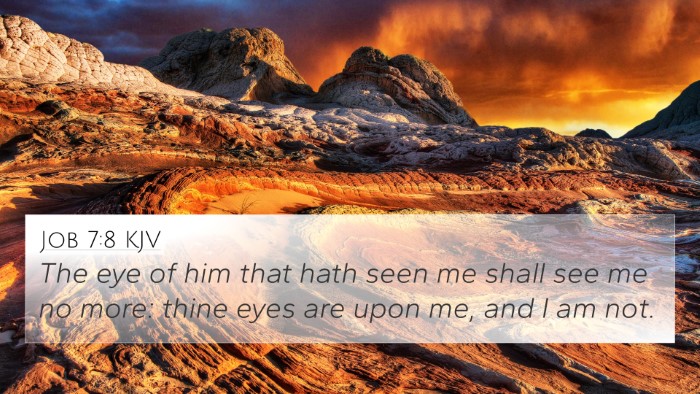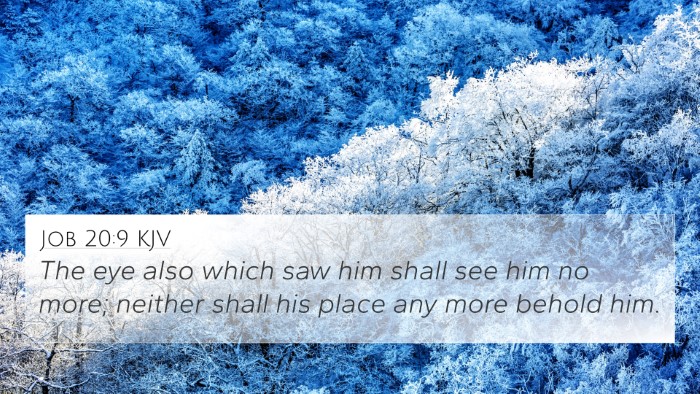Old Testament
Genesis Exodus Leviticus Numbers Deuteronomy Joshua Judges Ruth 1 Samuel 2 Samuel 1 Kings 2 Kings 1 Chronicles 2 Chronicles Ezra Nehemiah Esther Job Psalms Proverbs Ecclesiastes Song of Solomon Isaiah Jeremiah Lamentations Ezekiel Daniel Hosea Joel Amos Obadiah Jonah Micah Nahum Habakkuk Zephaniah Haggai Zechariah MalachiJob 8:18 Similar Verses
Job 8:18 Cross References
If he destroy him from his place, then it shall deny him, saying, I have not seen thee.
Uncover the Rich Themes and Topics of This Bible Verse
Listed below are the Bible themes associated with Job 8:18. We invite you to explore each theme to gain deeper insights into the Scriptures.
Job 8:18 Cross Reference Verses
This section features a detailed cross-reference designed to enrich your understanding of the Scriptures. Below, you will find carefully selected verses that echo the themes and teachings related to Job 8:18 KJV. Click on any image to explore detailed analyses of related Bible verses and uncover deeper theological insights.

Job 7:8 (KJV) »
The eye of him that hath seen me shall see me no more: thine eyes are upon me, and I am not.

Psalms 37:36 (KJV) »
Yet he passed away, and, lo, he was not: yea, I sought him, but he could not be found.

Job 20:9 (KJV) »
The eye also which saw him shall see him no more; neither shall his place any more behold him.

Psalms 73:18 (KJV) »
Surely thou didst set them in slippery places: thou castedst them down into destruction.

Psalms 92:7 (KJV) »
When the wicked spring as the grass, and when all the workers of iniquity do flourish; it is that they shall be destroyed for ever:

Psalms 37:10 (KJV) »
For yet a little while, and the wicked shall not be: yea, thou shalt diligently consider his place, and it shall not be.
Job 8:18 Verse Analysis and Similar Verses
Understanding Job 8:18
Job 8:18 states, "If he is destroyed from his place, then it will deny him, saying, 'I have not seen you.'" (Job 8:18, NKJV)
Summary and Meaning
This verse is part of a discourse by Bildad the Shuhite, one of Job's friends, who argues for the traditional understanding of divine justice. Here, we explore the implications of Bildad’s statements regarding human existence and divine judgment.
Commentary Insights
- Matthew Henry: Henry emphasizes the notion of stability in one's place—indicating that no one can stand on their own merit before God. He indicates that the loss of one's place represents a severe spiritual plight.
- Albert Barnes: Barnes focuses on the certainty of God's justice, asserting that his providences are as unchangeable as the laws of nature, emphasizing the futility in denying divine governance.
- Adam Clarke: Clarke points to the idea that one's downfall leads to a loss of identity, as highlighted by the phrase "deny him." Clarke relates this to the consequences of turning away from God and the inevitable judgment that follows.
Connections to Other Bible Verses
Job 8:18 finds various connections across Scripture, reflecting themes of divine justice, human frailty, and God’s sovereignty. Below are some Bible verse cross-references that enhance these themes:
- Job 4:8: "Even as I have seen, they that plow iniquity, and sow wickedness, reap the same." - This relates to the idea of sowing and reaping, linking one's actions to their ultimate fate.
- Job 5:12: "He disappointeth the devices of the crafty, so that their hands cannot perform their enterprise." - This references God's control over fate, reaffirming Bildad’s assertions.
- Psalms 1:5: "Therefore the ungodly shall not stand in the judgment, nor sinners in the congregation of the righteous." - This verse parallels the consequences depicted in Job's discourse.
- Proverbs 3:34: "Surely he scorneth the scorners: but he giveth grace unto the lowly." - Represents the divine reversal of fortunes for the proud and humble.
- Lamentations 3:34-36: "To crush under his feet all the prisoners of the earth, to turn aside the right of a man before the face of the most High, to subvert a man in his cause, the Lord approveth not." - Highlights God's justice concerning human actions.
- Isaiah 29:20-21: "For the terrible one is brought to naught, and the scorner is consumed, and all that watch for iniquity are cut off." - Reflects the consequences of wickedness.
- Galatians 6:7: "Be not deceived; God is not mocked: for whatsoever a man soweth, that shall he also reap." - Ties in closely with the biblical principle of justice and consequence.
Thematic Connections
Job 8:18 forms part of a broader dialogue on the themes of:
- Divine Justice: The idea that God is just in his dealings with humanity.
- Human Frailty: A reminder of man's vulnerable position before the Creator.
- The Nature of Repentance: The correlation between one's actions and the awaiting judgment.
Cross-Referencing Biblical Texts
Utilizing cross-references allows for deeper understanding of biblical themes. Employing tools for Bible cross-referencing, such as a Bible concordance or a Bible cross-reference guide, can facilitate these connections.
For example, analyzing the dualities presented in Job 8:18 alongside other scriptural texts can enhance comprehension of God's character and human moral responsibilities. Through cross-referencing Bible study, readers can affirm the reliability and consistency of biblical teachings.
Conclusion: The Importance of Contextual Understanding
In conclusion, a thorough exploration of Job 8:18 reveals significant insights into the themes of divine justice and the state of man. Through the lens of various commentaries and the rich inter-Biblical dialogue, readers can attain a more profound understanding of the complexities present in this verse.
By finding cross-references for verses such as Job 8:18, one can uncover a tapestry of biblical wisdom that supports the overarching narrative of the Scriptures.



